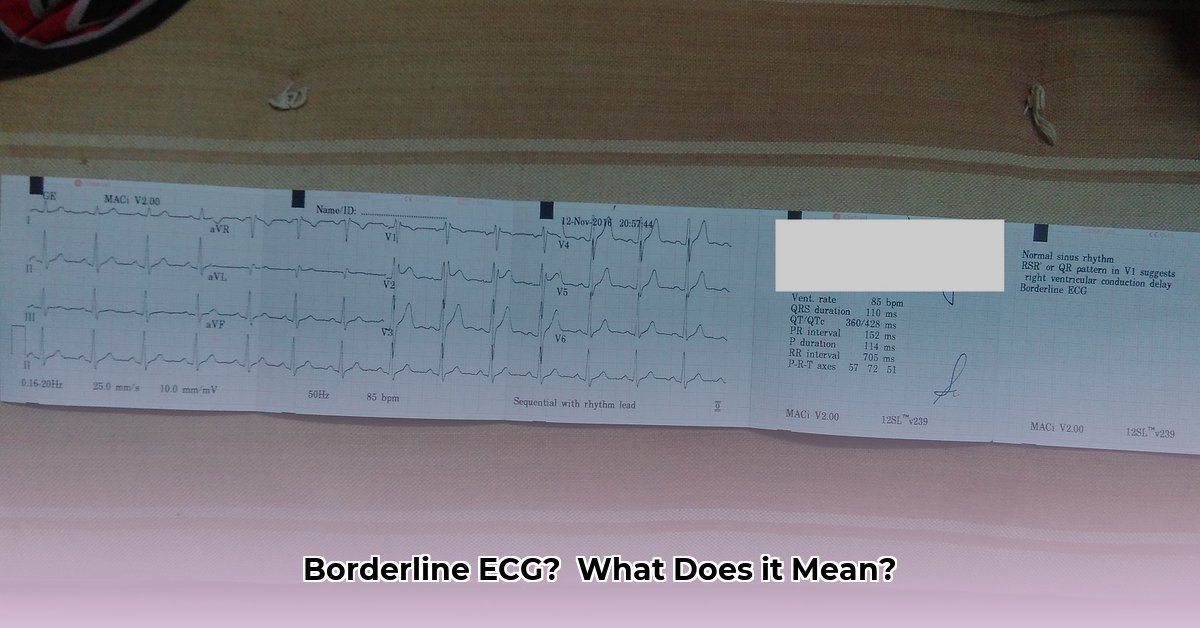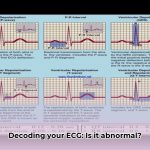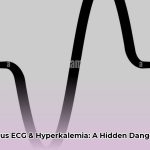Getting a “borderline” result on an electrocardiogram (ECG or EKG) can be unsettling. This guide provides clear, concise information about what a borderline ECG means, potential causes, and the next steps you should take. Remember, a borderline result doesn’t automatically mean heart disease. It simply means further investigation may be needed.
Decoding “Borderline”
A “borderline” ECG isn’t a diagnosis; it’s a descriptive term indicating that some measurements fall slightly outside the typical range. Think of it like a slightly blurry photo – the general image is there, but some details are unclear. It simply prompts a closer look. It’s essential to remember that a borderline ECG doesn’t confirm heart disease. It simply suggests additional investigation might be needed.
Possible Causes of a Borderline ECG
Several factors can contribute to a borderline ECG reading, ranging from benign, everyday habits to potential underlying health conditions.
- Lifestyle Factors: Caffeine, stress, nicotine use, dehydration, and lack of sleep can all subtly influence heart rhythm and lead to a borderline ECG.
- Medications: Certain medications can affect heart rate and rhythm, potentially causing a borderline reading. Be sure to discuss all your medications with your doctor.
- Electrolyte Imbalances: Variations in essential minerals like potassium or magnesium can disrupt the heart’s electrical activity.
- Underlying Heart Conditions: In some cases, a borderline ECG could be an early, subtle sign of a developing heart condition such as coronary artery disease or a heart rhythm problem. Further testing is essential to determine if this is the case.
- Technical Factors: Sometimes, the ECG itself might be the source of the borderline result. Incorrect electrode placement or patient movement during the test can sometimes create an unclear reading.
- Normal Variation: It’s crucial to remember that everyone’s heart is unique. What’s considered “normal” can vary slightly from person to person. A reading slightly outside the standard range might still be perfectly healthy for you.
What to Do After a Borderline ECG (A Step-by-Step Guide)
Step 1: Contact Your Doctor: This is the most crucial step. Your doctor will consider the ECG in the context of your overall health, medical history, and any symptoms you might be experiencing.
Step 2: Prepare for Your Appointment: Before your appointment, jot down any questions or concerns you have. This will ensure you make the most of your time with the doctor. Some questions to consider include:
- Could my lifestyle or medications be contributing to this result?
- What other tests might be needed?
- What are the next steps if further testing is recommended?
Step 3: Understand Potential Further Tests: Your doctor may recommend additional tests to gather more details about your heart’s function. Some common tests include:
- Repeat ECG: A second ECG can often clarify initial borderline findings.
- Holter Monitor: A portable device worn for 24-48 hours to continuously record your heart rhythm, providing a more detailed picture than a standard ECG.
- Echocardiogram: An ultrasound of the heart to assess its structure and function.
- Exercise Stress Test: Evaluates how your heart performs during physical activity.
- Blood Tests: To check electrolyte levels and other potential contributing factors.
Step 4: Follow Your Doctor’s Recommendations: Based on the complete assessment, your doctor might suggest lifestyle changes, medication, further monitoring, or a combination of approaches. Following their guidance is key to ensuring your heart health.
Summary of Borderline ECG Findings
| Potential Cause | Further Tests | Possible Outcomes |
|---|---|---|
| Normal variation | Repeat ECG | No further action needed |
| Lifestyle factors | Repeat ECG, Blood Tests | Lifestyle modifications |
| Medication side effects | Review medications, Repeat ECG | Medication adjustment |
| Electrolyte imbalance | Blood test | Electrolyte supplements |
| Underlying heart issue | Echocardiogram, Stress Test, Holter monitor | Treatment plan based on the specific heart condition identified |
Frequently Asked Questions (FAQ)
Is a borderline ECG serious? A borderline ECG is not inherently serious. Many individuals with such findings have no underlying heart problem. It simply warrants further evaluation.
What lifestyle changes can I make to support heart health? A heart-healthy lifestyle includes regular exercise, a balanced diet, stress management, adequate sleep, and avoiding smoking. Discuss specific changes with your doctor based on your individual needs.
Finding a Cardiologist
Your primary care physician can refer you to a cardiologist (a heart specialist). You can also find cardiologists in your area through online directories provided by organizations like the American Heart Association or the American College of Cardiology.
Disclaimer: This information is for educational purposes only and does not constitute medical advice. Always consult with a qualified healthcare professional for any health concerns or before making any decisions related to your health.
- Portable Hydroelectric Generators Harness Nature for Off-Grid Power - February 21, 2026
- Generate Free Electricity for Home From Renewable Sources - February 18, 2026
- Micro-Hydro Offers Cheapest Home Electricity if You Have a Stream - February 17, 2026
















